 Congratulations to Mastoureh Fathi for her latest paper: “I Make Here My Soil. I Make Here My Country” in Political Psychology.
Congratulations to Mastoureh Fathi for her latest paper: “I Make Here My Soil. I Make Here My Country” in Political Psychology.
Prof. Edwin van Teijlingen
CMMPH
Latest research and knowledge exchange news at Bournemouth University
 Congratulations to Mastoureh Fathi for her latest paper: “I Make Here My Soil. I Make Here My Country” in Political Psychology.
Congratulations to Mastoureh Fathi for her latest paper: “I Make Here My Soil. I Make Here My Country” in Political Psychology.
Prof. Edwin van Teijlingen
CMMPH
 Olivia Magnante, Undergraduate Student
Olivia Magnante, Undergraduate Student
I worked alongside Heather Hartwell and Veggieat to conduct my research for my dissertation project, which proved to be a great and interesting experience . Veggieat is a European project so it was quite unique to be able to be part of such a large scale project for my dissertation, as it would have been impossible for me to organise and conduct the same research without the help of Heather. This was not only a great experience, but it allowed me to gather really interesting and in depth results to discuss within my dissertation, as well as obtain a substantially larger sample size.
It was exciting to be working alongside so many researchers and for the time that I assisted, I was not seen as a “helper” or a “volunteer”, but as a researcher doing the same work and input as others which was also really important. Most importantly though, it was an enjoyable way to conduct research. Many people do not have the resources or time to conduct research on this scale so it was great to have the opportunity to be a part of something a bit different. I feel this gave me a really good set of results which can give you the basis of an interesting discussion. As a final year it is really important to try and strive to achieve what you want, and the dissertation is a good example of how continuous hard work can pay off.
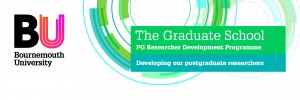 For all postgraduate Researchers – the following PG Researcher Development workshops are available throughout May:
For all postgraduate Researchers – the following PG Researcher Development workshops are available throughout May:
See PGR Workshops – An Overview for further information about the workshops. If any are of interest to you, booking is via myBU Graduate School PGR Community (don’t forget to log on with your student username and password)
The Politics and Media Research Group in FMC has a very stimulating guest speaker lined up for Monday 11th May. Dr. Jeffrey Murer is Lecturer on Collective Violence at the University of St. Andrews, in the School of International Relations. He is unusual for an IR specialist in that he draws deeply on ideas from psychoanalysis in his studies of violent political conflict. The title of his talk is “The Politics of Splitting: Anxiety, Loss and the Anti-Semitic, Anti-Roma Violence of Contemporary Hungary”. While focussing on the situation in Hungary, his talk will illustrate how an interdisciplinary, psycho-social approach can be applied to generate insights into violence in many other contexts.
The talk will be in P406. It will start at 5.00 and be followed, until 6.30, by questions and discussion.
All staff and students are welcome.

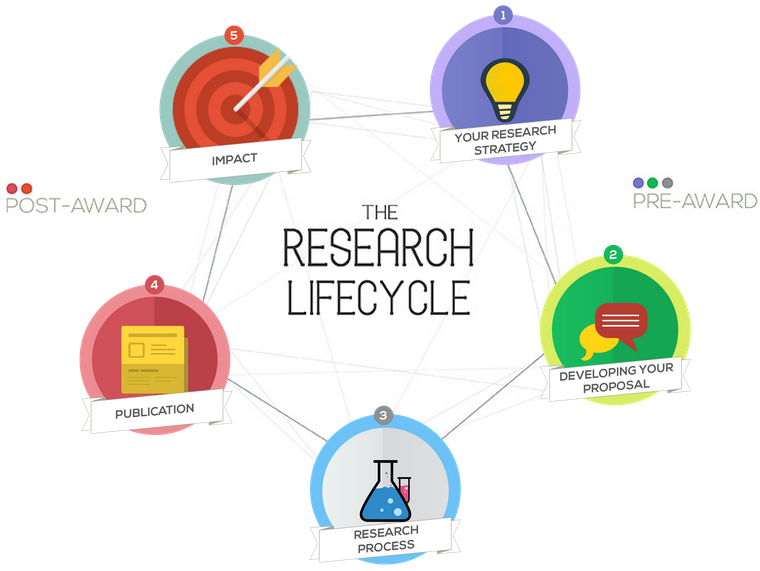
With recent requirements imposed by major research funders, researchers are presented with both opportunities and challenges – opportunities to re-use and re-purpose published outputs and datasets, and challenges in making one’s own work legally and ethically available to others.
Last year, thirty Northampton researchers contributed to focus groups looking at open access publications and data, with a particular focus on compliance with funder requirements. From the outcome of the focus groups, University of Northampton developed an Open Access and the research lifecyle guidance, which has been adapted to fit in with BU’s institutional policies.
This guide, which is part of a JISC-funded Open to Open Access project, is intended for researchers who wish to engage with the open access agenda, but aren’t entirely sure how best to achieve this. This short guide highlights some of the issues to consider at each stage of the research lifecycle and the tools that are available to support you.
Please click here – Open Access and the research lifecyle guidance to access a printable version of the guidance. For further queries, please get in touch with Pengpeng Hatch (pphatch@bournemouth.ac.uk) at RKEO.
Last week we (Prof Sara Ashencaen Crabtree and Prof Jonathan Parker) were fortunate to have been in Germany sharing and discussing social science research and its potential for achieving positive change in people’s lives.
First of all we attended the XVII SocNet98 conference held at the Hochschule Bremen, taking with us eight students from the Department of Social Sciences and Social Work in the Faculty of Health and Social Sciences.
At the conference we presented two extended workshop sessions and hosted a publishing meeting. The first session was particularly exciting for us as it introduced faculty and students from across Europe, including Finland, Belgium, Austria, Germany, the Czech Republic and the UK, to the centrality of religion and spirituality in understanding and accounting for people’s welfare needs; especially important given continuing migration patterns and recognition of a super-diversity of ethno-cultural and religious positions.
It was great that our three first-year sociology students attending with us were able to assist us in facilitating discussion subsequent to the presentation and to offer their own perspectives; something to add to their CVs! The five social work students who attended with us expressed recognition of the importance of intercultural and international sharing of ideas. All students found this opportunity illuminated their understanding of their discipline within the broader framework of academic internationalisation.
The Whiting & Birch international book series Critical Studies in Socio-Cultural Diversity has published two books relating to proceedings in previous SocNet98 conferences. Following the publishing meeting held in Bremen it was decided that a third would be published from this year’s conference edited by our colleague Prof Dr Christian Spatscheck and ourselves. This will include the paper given by our three sociology students Dan Marsh, Emilie Reeks and Ceyda Vasif and us; an excellent outcome for them in stepping up to their first academic publication.
Secondly, we gave an invited lecture at the University of Vechta, a dynamic rural university with a fascinating history reflecting preoccupations with prisons, penology and intensive animal farming. Vechta itself boasts of being the home region of the fabulous, real-life Baron von Munchausen. The invited guest lecture allowed us to promote awareness of the plight of the Orang Asli of Tasik Chini from our ethnographic research undertaken on study leave in Malaysia last year; a study that is now being written up. We heard later that the lecture was very well received by students and staff attending. To our pleasure and surprise we also bumped into former Erasmus students from Vechta who had joined our sociology classes last year. We look forward to receiving more Vechta students this coming Autumn.
Subsequently, we negotiated research and publication opportunities with academic colleagues and an extension of our Erasmus links for student exchanges as we move forward towards approving our new Sociology and Criminology programme later this year. Vechta is well placed for partnership with this programme having a prison right next to the University – our colleagues assured us that the barbed wire atop the walls were not to keep in their students! Academic staff at Vechta were excited about developing programmes in English for reciprocating BU Erasmus exchanges and about possible prison visits and observations. In the late afternoon we visited an old prison within the town fort’s arsenal, replete with history and stark examples of potentially dualistic practices of disciplining the body and humiliation of the spirit throughout the history of regulating social behaviour in Vechta.
All-in-all this was a great week for today’s students, bodes well for future students and was a very productive one for ourselves.
Jonathan Parker & Sara Ashencaen Crabtree
Mark Painter, Centre for Entrepreneurship Manager, was invited by the DCCI to participate in a business consultation with the Dorset local authorities focussing on economic development.
Dorset’s nine councils are looking to promote economic growth and cooperation by working together differently and are inviting businesses and stakeholders to have their say.
All of Dorset’s councils believe economic development is a priority. Council leaders have agreed that it makes sense to review whether or not their combined governance in the field of economic development and transport strategy could be improved. This would cover such things as how decisions are made on overall priorities. Separate to this, councils are also considering bringing together in one team some of the staff involved in providing the economic development and transport services.
The Councils asked the DCCI to be engaged in the consultation who invited their Business Partners to a dedicated Business Partner consultation with senior representatives of the local authorities in the area covered by Dorset County Council and Bournemouth and Poole Unitary Councils.
Mark Painter said, ‘I was delighted to have been invited to this consultation and enable Bournemouth University to contribute to this important discussion around key issues and opportunities in the local economy.’
Further details can be found at www.dorsetforyou.com/prosperous-dorset
‘Can you tell the story of your research in a single image?’ That’s the challenge we set BU’s academics and postgraduates earlier this year, and the overwhelming response saw researchers from all across the university downing tools to take up their cameras and think of unusual ways to illustrate their research.
The resulting images demonstrate not just the creativity of our academics and postgraduates, but also the fascinating range of research taking place at BU.
Researchers from all across the university, working in areas as diverse as dementia, archaeology, kayaking and 3D printing submitted images to the competition.
Thousands of BU students, staff and members of the public voted for their favourite images, and we can now reveal the winners.
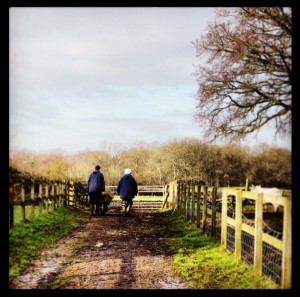
Down on a farm, tucked away in the beautiful Dorset countryside, the therapeutic use of farming practices is being used to provide health, social and educational care services for a wide range of people. The farm offers the opportunity for people who are the hardest to reach, to utilise a rural environment to enhance their well-being and to achieve their potential. The farm has achieved many great success stories of people who have turned their lives around, been given confidence in their own value and become equipped with the learning they need to successfully engage in wider society. The challenge they now face is to show this model of care is successful to enable their work to continue and grow.
Historically, much of the awareness and research regarding mental health issues has focused predominantly on females, whilst males with mental health concerns have faced an element of negativity from society, despite being at higher risk of depression and loneliness, alcohol dependency, attention deficit hyperactivity disorder and suicide. My study aims to explore the benefits of the care farm model as an alternative social care intervention on improving physical / mental health outcomes and the quality of life of young males with behavioural, emotional and social difficulties as well as older men with dementia, and the benefits of intergenerational interaction between the two groups.
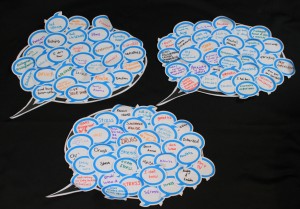
1 in 4 of us will experience mental health problems in our lifetime. The pathophysiology of mental illness involves a interplay of genetic and environmental factors and it is only the last few years that the aetiological picture has started to show. As a result uncertainty and oversimplified ideas regarding the causes of mental illness exist. This can exacerbate stigma and increase the emotional burden of mental illness amongst families. A major function of Psychiatric Genetic Counselling is to help affected individuals and families. This can help them successfully adapt to the condition as well as address and reduce feelings of shame, guilt, blame and stigma, thus having both informative and therapeutic values.
I will explore understanding amongst the UK about the causes of mental illness in order to evaluate the application of Psychiatric Genetic Counselling to the UK. This photograph captures 100 BU students’ answers to the question: “What causes mental illness?”
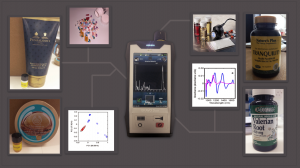
The last decade has witnessed a change in the use of medicine products beyond diseases’ treatments to improve an individual’s life. Lifestyle products include medicines, cosmetic and herbal products which improve physical appearance and physical/mental performance. Counterfeit lifestyle products could be encountered anywhere across the wholesale supply chain.
The effects resulting from a counterfeit lifestyle product could range from ineffectiveness (at their best) to toxic/lethal effects (at their worst). As these products can be encountered anywhere, it is important to develop rapid, non-destructive and mobile technology for their identification. Handheld instruments techniques offer these advantages. Therefore, this project underlies developing methods for the rapid and non-destructive identification of counterfeit lifestyle products using handheld spectroscopic techniques.
In particular, the project involves building libraries which contain signatures of lifestyle products and materials commonly present in these products.
Two day Masterclass, Thursday 11th and Friday 12th June, Executive Business Centre, Lansdowne Campus
Art has been said to be a way to express ourselves, to make sense of our experiences and to connect with ourselves, others, our world and life. The arts are beginning to gain greater recognition as a deep form of learning.
This Masterclass will provide health and social care educationalists and practitioners with the opportunity to immerse themselves in hands-on arts experience and come away with individualized working methods to adapt in their own practice and learning contexts. No previous experience of the arts is necessary.
Dr Catherine Lamont-Robinson is an artist/researcher, with a BA and MA in Fine Art and a Doctorate in Education. Catherine is passionate about creative engagement and bringing different ways of knowing into practice – drawing on the role of tacit knowledge, discourses around embodiment and whole-body intelligence. She has worked for over ten years in clinical, educational and community contexts and is a Senior Associate Lecturer at Bristol University facilitating Creative Arts and Humanities within Social and Community Medicine.
Schedule:
Each day will start at 9.30am and run until 4.15pm with regular refreshment breaks and lunch provided. The two days will include some presentations, discussions and practical sessions.
Booking Information:
This price includes two full days with the course facilitator, all refreshments and all class materials. Accommodation and travel costs are not included.
Book your place online by 1 June 2015 at https://using-art-in-health-and-social-care.eventbrite.co.uk
For more information contact: (01202) 962184 / rfreeman@bournemouth.ac.uk
The following calls are now open on the Participant Portal. All relate to the main Horizon 2020 pillar – Science with and for Society
All close on 16/9/15 at 17:00 (Brussels local time) 
Please click on the links for more information, including the call documentation.
You should also contact Emily Cieciura or Paul Lynch (Research Facilitators – EU and International) or contact your RKEO Funding Development Officer if you intend to apply to any of these schemes, ensuring that we can help you at the earliest opportunity.
NIHR research programme boards and panels select the most important research questions to commission, and make funding recommendations on project applications.
They are looking for additional expertise for the boards or panels of the following programmes:
For more information please see: Opportunities to influence Health Research
COST is the longest-running European framework supporting trans-national cooperation among researchers, engineers and scholars across Europe.

As part of the projects, training courses or other events are often arranged. The following are taking place in the next few months:
5th to 7th May : Training school: Applications of Ground Penetrating Radar in Urban Areas – the Sensitive Case of Historical Cities (grants available)
8th to 9th June : Is fascism on the rise? A dialogue between social psychologists and historians on collective memory and the current revival of fascist ideologies
12 June : COST Highlights on Nanotechnology and Advanced Materials – as part of the EuroNanoForum 2015
To find out more, follow the links or for more information about COST, go to the website. You can also register for updates, find out about submitting your own COST application, join an existing action or become a COST expert.
The call for proposals is now open for this year’s ESRC Festival of Social Science, which will run between the 7th and 14th November. Funding of up to £1500 is available for the Festival , and with Bournemouth University becoming an official partner of the Festival, now is the time to start thinking about submitting a proposal if you wish to be involved in 2015.
If you’re struggling for inspiration for what type of event you can submit for this year, below you can find the third in a series of blog posts which will highlight popular events from previous years of the Festival.
’12 Survival stories: learning from narratives about surviving disasters’ was an event which was run during the 2012 ESRC Festival which generated great interest.
The Survival Stories workshop explored community resilience and capacity in disaster responses. It included a Sri Lankan tsunami survivor recounting narratives that bring to life ESRC funded research on the 2004 tsunami; explored empowering approaches to disasters that respected recipients’ needs and priorities; and considered lessons relevant to the UK. Are you inspired to run an event similar to 12 Survival stories at this year’s ESRC Festival?
Once you have decided on a proposal idea and are ready to submit an event, the next step will be to complete the application form, which can be found here. If you have any further queries or would like help with ideas for your event, you can email fol@bournemouth.ac.uk and we’ll be happy to help. Alternatively, if you would like to gain more inspiration from past events from looking at previous year’s events, please click here.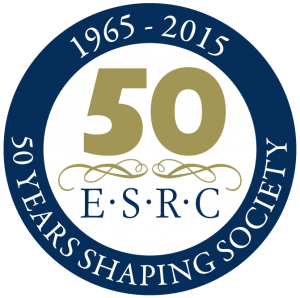
This Royal Society scheme gives policymakers and research scientists an opportunity to experience each other’s worlds.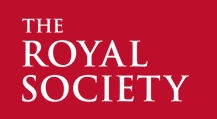
Each year 30 research scientists are paired with UK parliamentarians and civil servants. They learn about each other’s work by spending time together in Westminster and the researcher’s labs. Those taking part gain an insight into how research findings can help inform policy making, and come away with a better understanding of how they can get involved.
See who has taken part in previous years.
The scheme takes place annually, beginning with a ‘Week in Westminster’ in which the pairs first meet. Over the week the scientists take part in workshops, hear from invited speakers and spend two days shadowing their pair. Read last year’s ‘Week in Westminster’ agenda (PDF).
After the ‘Week in Westminster’, it is the turn of the parliamentarians and civil servants to get an insight into the world of research, undertaking reciprocal visits with their pairs.
The 2015 scheme is currently open to applications and will close on 24 May 2015. Please fill in the online application form and send your CV and a completed equal opportunities monitoring form (DOC) to publicaffairs@royalsociety.org.
Following on from the recent post on Pirrus, please read on to find out more…
According to a recent survey of the Association of Research Managers and Administrators’ members, over 3 out of 5 ARMA members find creating multi-disciplinary relationships challenging.
The survey found that a large majority of members (80%) thought that creating relationships between different disciplines was critical to their role but 71% found it challenging to achieve.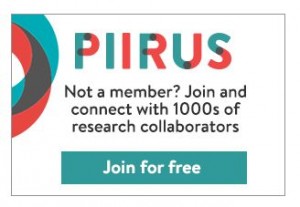
Other key findings from the survey:
• 87% thought identifying research trends was important to their role – but over half found it challenging in practice
• 76% found creating relationships between researchers in different geographies challenging
• 66% thought creating relationships with researchers in specific institutions was important to their role
Piirus, a free service for the global research community – allows researchers from institutions around the world, and across disciplines, to connect and collaborate more easily.
However, despite the benefits of academic social networks like Piirus, the survey found that only one third of those surveyed were members of academic networking sites. Furthermore, over 75% of members who did use academic networking sites, do not utilise them to identify and create connections for their researchers.
Commenting on the findings, Fiona Colligan, Head of Piirus said: ‘We see Piirus as not only as a much needed offering from the sector to help connect researchers to opportunities but also as a solution to the challenges raised by ARMA members in their role supporting researchers. We are delighted to offer Piirus to this important professional community and look forward to working with ARMA members to learn how we can grow this service in our joint pursuit in supporting research excellence’
To join, go to the Piirus site. It is free!
Dr Fiona Kelly attended the Dementia North Sea meeting in Treviso, Italy from 22nd to 24th April 2015. This is an informal meeting of researchers and practitioners from across Europe who meet annually to share research findings and to update on the work of their dementia research and practice centres. This year, there were delegates from the UK, France, Norway, Belgium, Germany, the Netherlands, Denmark and Italy. The meeting started with a welcome from our hosts from the Istituto per Servizi di Ricovero e Assistenza agli Anziani (The Institute for Services, Hospital and Elderly Care) and followed with updates from each centre, including any political developments relating to dementia. It continued with presentations from each delegate and we heard about a variety of initiatives, including the development of a technology toolbox for people with dementia and their family caregivers to try out different technologies before committing to buying them, an e-learning game for professional caregivers, a programme to develop a global definition of person centred care and to place care on an equal footing with cure, innovative day care models including a house run and managed by people with dementia and the development of an audit tool to measure the quality of dementia gardens.
Delegates visited three specialist units for people with dementia, showcased as being innovative for their design and practice. It was interesting to see how a very strong focus on meeting social, spiritual and sensory needs, providing access to outdoors and combining cognitive stimulation therapy to community dwelling people with dementia was juxtaposed by a strong medical input, particularly when caring for people with dementia nearing the end of life.
On the second evening we were treated to a water bus journey through Venice, ending up in the impressive St Mark’s Square where 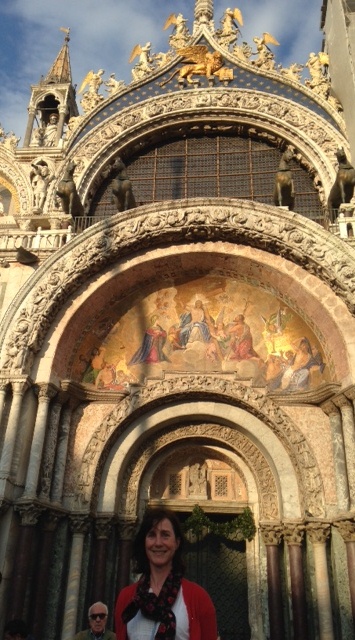 we strolled in the Spring evening sunshine.
we strolled in the Spring evening sunshine.
Our meal of traditional Venetian food of sea food and squid ink risotto, baked fish with roasted vegetables and tiramisu was lively with talk of dementia ideas, collaborations and anecdotes. Our dash on a water taxi to catch the last train back finished off the night on a high, if relieved, note.
The final day saw presentations on creative innovations in dementia care and included a presentation by Dr Kelly on preliminary findings from an evaluation of the BUDI orchestra. A thread running through these presentations was the potential of the arts for fun, mutual learning, social inclusion, the equalising of those who take part and improvements in well-being, even if in the moment.
BUDI are delighted to host the event in April 2016 and we look forward to welcoming our European colleagues to Bournemouth.
A paper published by BU’s Dr. Zulfiqar Khan in the Journal of Adhesion Science and Technology has become the Journal’s third most read paper within only four months of publication.
Dr. Khan’s paper entitled – Modelling of metal-coating delamination incorporating variable environmental parameters – was a joint publication between BU’s Sustainable Design Research Centre and the Defence Science and Technology Laboratory (DSTL), Salisbury.
The paper was published open access, making it much easier for people interested in the research to access and use it immediately. The benefits of publishing open access can clearly be seen in terms of numbers who have read the paper. Within four months, it has been read nearly 800 times, while the second most popular article – accessible only to those who subscribe to the journal – has been read 814 times since August 2012.
To find out more about open access publishing and how BU’s open access fund can support you, contact Pengpeng Hatch, Research Outputs Advisor in RKEO.
As colleagues will be aware, I have been a passionate advocate of education for sustainability (EfS) and global citizenship. I have worked across the sector to support change, and within BU have contributed to such things as the People and Planet Green League, Eco-campus and many other iniatives to enhance our environmental credentials but also to ensure that through education, we prepare students to lead (and make a difference) in a context that is global but also has to be sustainable.
We have more to achieve at BU in relation to the educative agenda, so in this regard I am sharing this work from Australian colleagues. I would not suggest that we need to impose standards but I would suggest that we might all consider how we could do more to ensure that the learning we provide enables our graduates to become better custodians of the world.
New Learning and Teaching Standards for Environment and Sustainability Higher Education
New national standards for tertiary qualifications in Environment and Sustainability have now been released. The standards are endorsed by the Australian Council of Environmental Deans and Directors (ACEDD) and have been developed through an intensive twelve month process, including consultation with the broad Australian and international stakeholder community of tertiary educators and researchers, employers and practitioners, students, indigenous people and other environmental educators. These standards can be used to design and deliver innovative environment and sustainability higher education in Australia. The standards are included in the Learning and Teaching Academic Standards Statement for Environment and Sustainability, available from http://environmentltas.gradschool.edu.au/ or via the Australian Government Office for Learning and Teaching website (http://www.olt.gov.au/project-learning-and-teaching-academic-standards-ltas-environment-and-environmental-sustainability-2). For more information about the standards and the process of their development please contact the project co-leaders:
Dr Bonnie McBain (Bonnie.McBain@newcastle.edu.au) or
Dr Liam Phelan (Liam.Phelan@newcastle.edu.au).